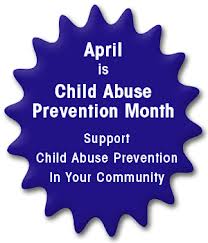There are many titles that fit me, including Youth Advocate, Foster Care Advocate, and Mother. I love humanity. I have a special place in my heart for all people but I believe strongly that children and teenagers deserve special care, consideration, and concern. In a nutshell, that is why I do what do.
Today is April Fool’s Day but what I’m writing about today is no laughing matter. April is National Child Abuse Prevention Month.
History:
Increasing public awareness of the need to ensure the safety and welfare of children led to the passage of the first Federal child protection legislation, the Child Abuse Prevention and Treatment Act (CAPTA), in 1974. In 1983, April was proclaimed the first National Child Abuse Prevention Month. As a result, child abuse and neglect awareness activities are promoted across the country during April of each year. While CAPTA has been amended many times over the years, most recently with the CAPTA Reauthorization Act of 2010, the purpose of the original legislation remains intact.
As you can see from the description above, one goal of National Child Abuse Prevention Month is to spread the message that each of us has a role to play in ensuring that all children grow up in safe homes and communities. Any person who suspects that a child is being harmed can (and should) report their suspicions to the proper authorities. Children’s lives are depending on it. Our child welfare system (like every other system) has flaws and not every abuse case is reported or properly handled once reported. Some children and families suffer in silence. Because only the most horrendous child abuse cases make it to the evening news, we need to understand child abuse prevention.
Every family has strengths and every family faces challenges. A healthy family support network includes a safe place for children and teens to play and socialize, available (and adequate) food, shelter, and medical care, quality schools, meaningful employment opportunities, and a culture that encourages neighbors to connect and assist each other. Prevention of child abuse also includes parenting education (formal or informal) that explores bonding with your child, stages of child development, stress management, and pregnancy prevention. Mental health and substance abuse treatment are also an important part of this equation.
Your compassion, your voice, and your community interaction, are also crucial in the fight to end child abuse. In part II of this blog series I will provide warning signs of child abuse and neglect.
Nicki Sanders, MSW, Chief Visionary Officer
The Teen Toolbox utilizes youth portfolio development and civic engagement and academic empowerment strategies to help teens set goals for life after high school and create a road map to reach those goals through its PACKAGED FOR SUCCESS™ Programs. We are committed to supporting and raising awareness about the needs and potential of teenagers in the foster care system.
© Copyright Protected. ALL RIGHTS ARE RESERVED.
